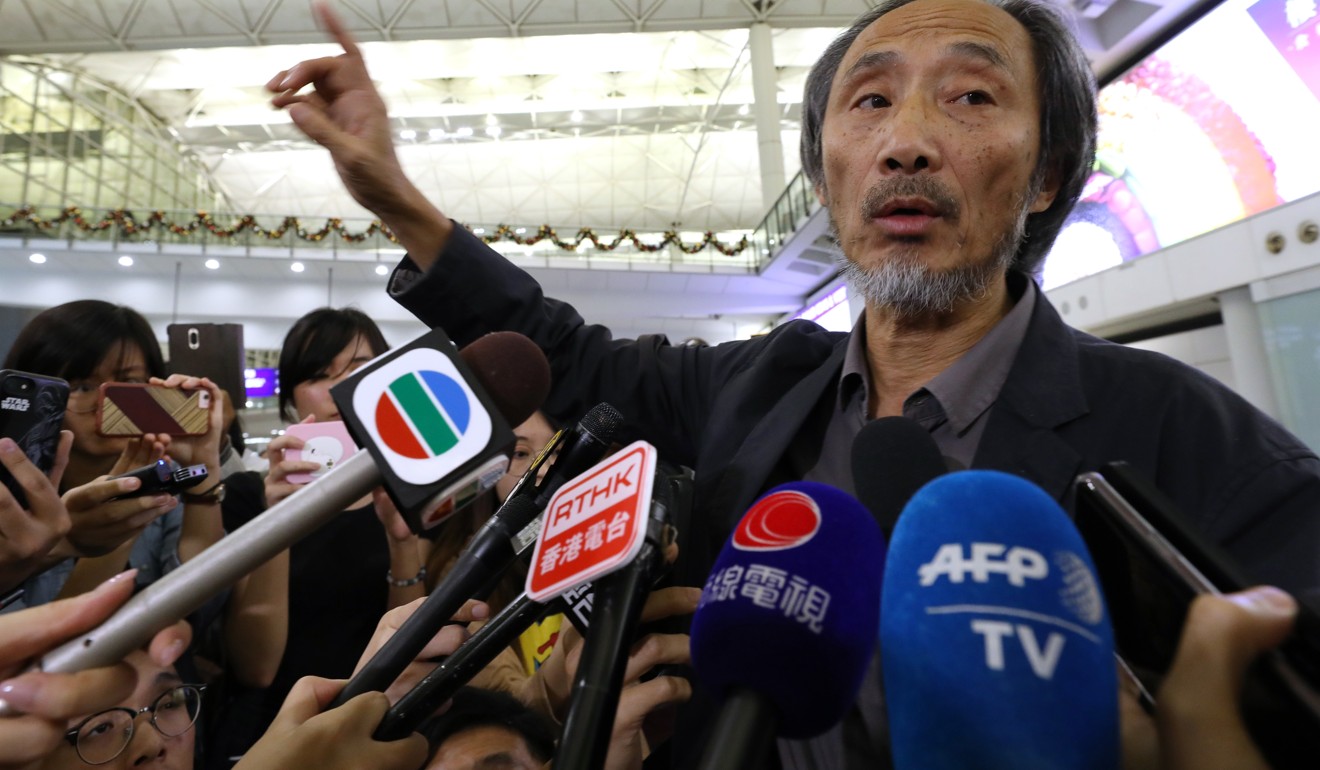
Hong Kong government had nothing to do with earlier decision to cancel Tai Kwun talk by dissident Chinese writer Ma Jian, Carrie Lam says
- Chief executive says she only learned about the incident through news reports
- Chinese author says case proves ‘self-censorship is nothing invincible’
Ma, who arrived on Friday, had suggested heritage site Tai Kwun’s initial cancellation of his appearance was influenced by powers beyond the arts centre and its parent group, the Hong Kong Jockey Club.

The row erupted on Thursday, when Tai Kwun – a defunct police station turned culture hub – said it was cancelling two scheduled events involving Ma as part of the Hong Kong International Literary Festival.
At the time, the venue’s director, Timothy Calnin, said Tai Kwun should not be used to “promote the political interests of any individual”.
I am happy that the incident has been resolved
On Friday, a second venue owned by property developer Nan Fung also refused to host Ma.
In a U-turn, Tai Kwun then gave Ma the go ahead, after Calnin said the author had made clear he had no intention of using the platform to promote his political interests.
Ma appeared on Saturday at a panel discussion titled “Hong Kong Through The Lens of Literature” with two local writers, and introduced his new novel China Dream .
At a press conference by organisers in Tai Kwun on Saturday morning, Ma said his smooth entry into the city proved the Hong Kong government did not have a hand in the initial cancellations.
Ma called on Hongkongers to stand up against censorship and defend free speech in the city.
Ma Jian lands in Hong Kong as venue reverses decision to cancel talks
“My case proved that self-censorship is nothing invincible. We must be brave and break it because free speech is the foundation of civilisation,” Ma said.
He said Tai Kwun’s earlier decision to cancel his talks came from ignorance on the nature of literature.
“Novels and literature in general include a great variety of knowledge, ranging from psychology and phytology to politics,” Ma said. “Judging an author by singling out the political elements in his works is an act of ignorance.”
Judging an author by singling out the political elements in his works is an act of ignorance
Ma said China Dream was a political allegory dedicated to George Orwell, who wrote the dystopian novel 1984.
“Orwell wrote what he thought would happen and in response, I wrote what has occurred,” Ma said.
“I hope my book can make Hong Kong readers reflect on their current situation … and whether free speech is suppressed as the city seeks to be part of the China dream touted by the Beijing government.”
The author revealed that before he left London – where he is based – he told members of parliament about his trip, and the details were then shared with the British foreign affairs office.
“If anything untoward happened to me, the British government would look for me and protect me. This is what I enjoy in a democratic country,” said Ma, who holds a British passport and has Hong Kong permanent residency.
He warned Hong Kong readers they could no longer treat literature as merely a sanctuary from reality.
“I understand that people here are feeling insecure, and I understand that words alone cannot defeat political power, but through reading and sharing, we can uphold the basic principles of humanity and morality,” he said.
Chinese dissident novelist Ma Jian on challenging China and a place to call home
“Generations of writers have done this. And now it’s our turn, despite the complications we are facing.”
Phillipa Milne, director of the festival, said organisers were delighted that Tai Kwun had reversed its stance, but declined to disclose any further details of their interactions with the venue operator and the Nan Fung Group.
Simon Westcott, co-chairman of the festival, said questions over the cancellations would have to be handled after the event ended on Sunday.
Separately, Lam said the government would safeguard freedom of speech and expression, as well as the freedom to participate in cultural and arts events, but it could not control decisions made by venue operators.
“I am happy that the incident has been resolved,” she added.
On Saturday afternoon, all 90 seats available for Ma’s first talk with two local authors Ng Mei-kwan and Hon Lai-chu were taken before the event began at 5pm.
At the start of the talk, Ng, who is also president of the Hong Kong Literary Criticism Society, read out a declaration in protest against Tai Kwun.
Artist steps into action with Tai Kwun protest over Ma Jian debacle
“Venues are extremely scarce in the literary scene in Hong Kong, and Tai Kwun is using public resources,” Ng said.
“How come Tai Kwun’s management took advantage of their control over the platform, to promote … and extend political interests of some other individuals?”
On the sidelines of the event, Ng told the Post that most of the cultural spaces in the city was controlled by the government and its affiliated organisations.
“The venues’ boards mainly comprise of businessmen who have interests on the mainland, and therefore tend to overly worry,” she said.
Chris Ng, audience member and founder of the Progressive Lawyers Group, said the cancellation had been unnecessary and unwise.
“The mission of Tai Kwun was to promote the development of the arts. And the arts cannot stand alone from politics. Restricting free expression with self-censorship is unwise,” the barrister said.
“It seems that Tai Kwun underestimated the reaction from the public and the literati, who have a strong self-defence mechanism against political interference.”


